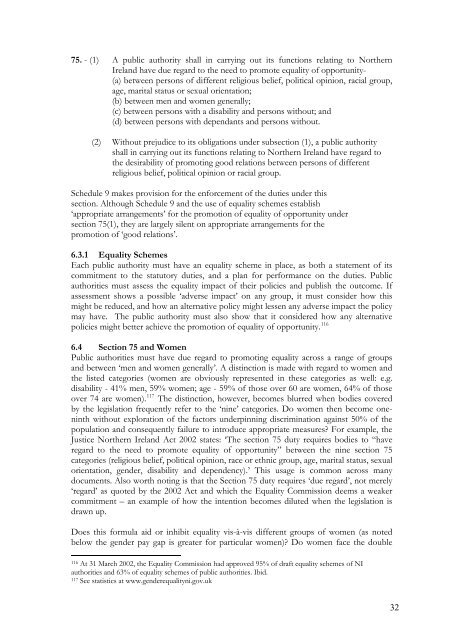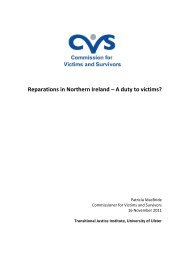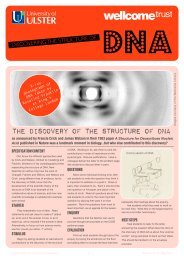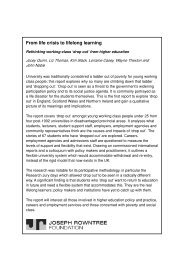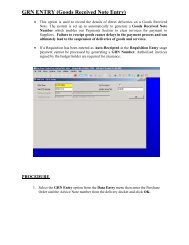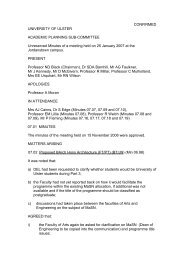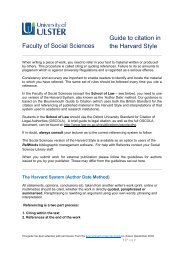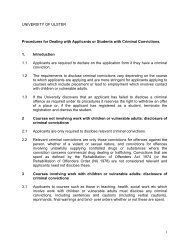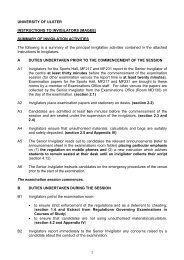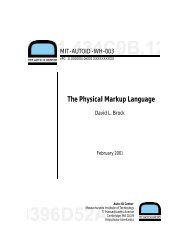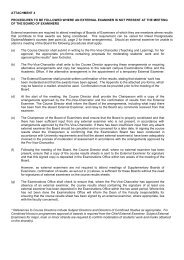Agreement Reached in the Multi-Party Negotiations - Transitional ...
Agreement Reached in the Multi-Party Negotiations - Transitional ...
Agreement Reached in the Multi-Party Negotiations - Transitional ...
You also want an ePaper? Increase the reach of your titles
YUMPU automatically turns print PDFs into web optimized ePapers that Google loves.
75. - (1) A public authority shall <strong>in</strong> carry<strong>in</strong>g out its functions relat<strong>in</strong>g to Nor<strong>the</strong>rn<br />
Ireland have due regard to <strong>the</strong> need to promote equality of opportunity-<br />
(a) between persons of different religious belief, political op<strong>in</strong>ion, racial group,<br />
age, marital status or sexual orientation;<br />
(b) between men and women generally;<br />
(c) between persons with a disability and persons without; and<br />
(d) between persons with dependants and persons without.<br />
(2) Without prejudice to its obligations under subsection (1), a public authority<br />
shall <strong>in</strong> carry<strong>in</strong>g out its functions relat<strong>in</strong>g to Nor<strong>the</strong>rn Ireland have regard to<br />
<strong>the</strong> desirability of promot<strong>in</strong>g good relations between persons of different<br />
religious belief, political op<strong>in</strong>ion or racial group.<br />
Schedule 9 makes provision for <strong>the</strong> enforcement of <strong>the</strong> duties under this<br />
section. Although Schedule 9 and <strong>the</strong> use of equality schemes establish<br />
‘appropriate arrangements’ for <strong>the</strong> promotion of equality of opportunity under<br />
section 75(1), <strong>the</strong>y are largely silent on appropriate arrangements for <strong>the</strong><br />
promotion of ‘good relations’.<br />
6.3.1 Equality Schemes<br />
Each public authority must have an equality scheme <strong>in</strong> place, as both a statement of its<br />
commitment to <strong>the</strong> statutory duties, and a plan for performance on <strong>the</strong> duties. Public<br />
authorities must assess <strong>the</strong> equality impact of <strong>the</strong>ir policies and publish <strong>the</strong> outcome. If<br />
assessment shows a possible ‘adverse impact’ on any group, it must consider how this<br />
might be reduced, and how an alternative policy might lessen any adverse impact <strong>the</strong> policy<br />
may have. The public authority must also show that it considered how any alternative<br />
policies might better achieve <strong>the</strong> promotion of equality of opportunity. 116<br />
6.4 Section 75 and Women<br />
Public authorities must have due regard to promot<strong>in</strong>g equality across a range of groups<br />
and between ‘men and women generally’. A dist<strong>in</strong>ction is made with regard to women and<br />
<strong>the</strong> listed categories (women are obviously represented <strong>in</strong> <strong>the</strong>se categories as well: e.g.<br />
disability - 41% men, 59% women; age - 59% of those over 60 are women, 64% of those<br />
over 74 are women). 117 The dist<strong>in</strong>ction, however, becomes blurred when bodies covered<br />
by <strong>the</strong> legislation frequently refer to <strong>the</strong> ‘n<strong>in</strong>e’ categories. Do women <strong>the</strong>n become onen<strong>in</strong>th<br />
without exploration of <strong>the</strong> factors underp<strong>in</strong>n<strong>in</strong>g discrim<strong>in</strong>ation aga<strong>in</strong>st 50% of <strong>the</strong><br />
population and consequently failure to <strong>in</strong>troduce appropriate measures? For example, <strong>the</strong><br />
Justice Nor<strong>the</strong>rn Ireland Act 2002 states: ‘The section 75 duty requires bodies to “have<br />
regard to <strong>the</strong> need to promote equality of opportunity” between <strong>the</strong> n<strong>in</strong>e section 75<br />
categories (religious belief, political op<strong>in</strong>ion, race or ethnic group, age, marital status, sexual<br />
orientation, gender, disability and dependency).’ This usage is common across many<br />
documents. Also worth not<strong>in</strong>g is that <strong>the</strong> Section 75 duty requires ‘due regard’, not merely<br />
‘regard’ as quoted by <strong>the</strong> 2002 Act and which <strong>the</strong> Equality Commission deems a weaker<br />
commitment – an example of how <strong>the</strong> <strong>in</strong>tention becomes diluted when <strong>the</strong> legislation is<br />
drawn up.<br />
Does this formula aid or <strong>in</strong>hibit equality vis-à-vis different groups of women (as noted<br />
below <strong>the</strong> gender pay gap is greater for particular women)? Do women face <strong>the</strong> double<br />
116 At 31 March 2002, <strong>the</strong> Equality Commission had approved 95% of draft equality schemes of NI<br />
authorities and 63% of equality schemes of public authorities. Ibid.<br />
117 See statistics at www.genderequalityni.gov.uk<br />
32


